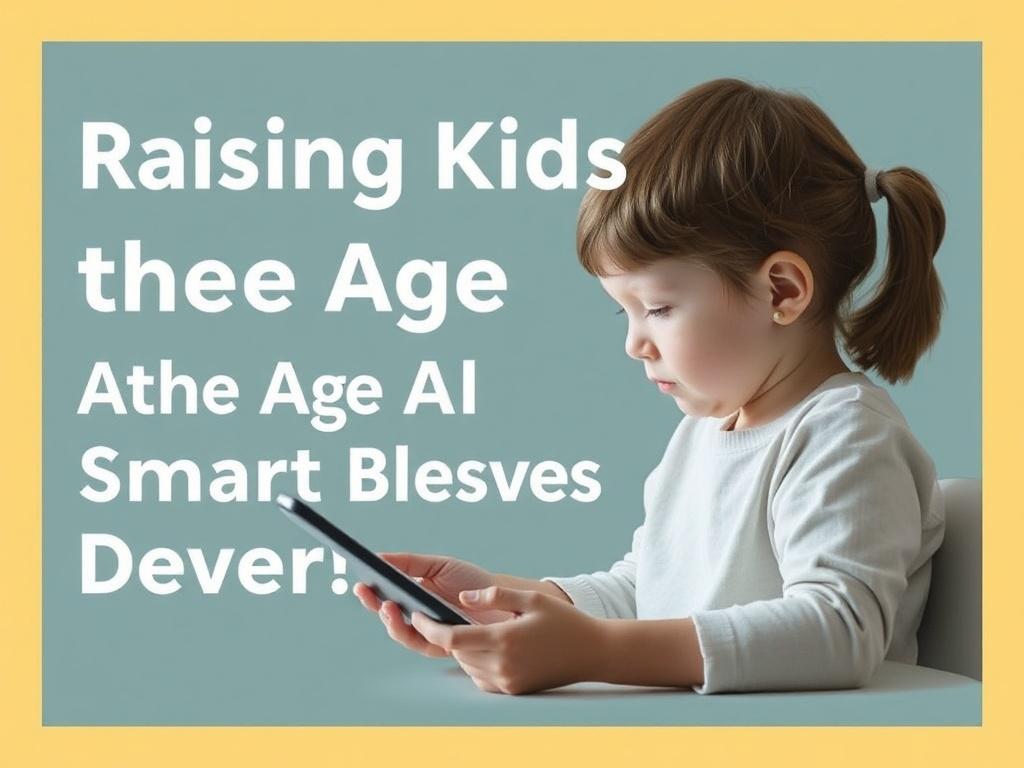SQLITE NOT INSTALLED
In today’s rapidly evolving digital landscape, parents face a variety of new challenges and opportunities when it comes to raising children. The surge of artificial intelligence (AI) and the widespread presence of smart devices have reshaped how young minds grow, learn, and interact. This transformation compels parents to rethink traditional parenting strategies and adopt more informed approaches that balance technology’s benefits with its potential risks.
This article will delve deeply into the multifaceted world of raising kids in the age of AI and smart devices. We’ll explore what AI means for children, how smart devices influence their development, tips for healthy technology habits, and how parents can empower their kids to thrive in a tech-filled world. Whether you’re a seasoned parent or just starting your family journey, this guide offers practical advice and insights to help you navigate the complexities of modern parenting.
Understanding the Role of AI and Smart Devices in Children’s Lives
Artificial intelligence and smart devices are no longer futuristic concepts; they are an integral part of everyday life. For children growing up today, AI seems like a natural extension of the world around them. From voice assistants like Siri and Alexa to smart toys and learning apps, AI technologies are omnipresent. This ubiquity raises essential questions about how these technologies shape children’s experiences and development.
First, let’s define what we mean by AI and smart devices. AI refers to machines or software systems capable of performing tasks that typically require human intelligence, such as problem-solving, learning, and adapting. Smart devices, on the other hand, are electronic gadgets connected to the internet that can collect data, analyze information, and often communicate with other devices or users. Smartphones, tablets, smartwatches, and even smart home assistants fall under this umbrella.
Children interact with AI and smart devices for various purposes: entertainment, education, communication, and creativity. Yet, while these tools open up exciting possibilities, they also introduce new risks, such as privacy concerns, addiction potential, and social isolation.
AI-Powered Learning Tools: Revolutionizing Education
One of the most promising aspects of AI for children is its potential to enhance learning. AI-powered educational apps can adapt to a child’s learning pace, recognize areas of difficulty, and provide personalized feedback. For example, language-learning apps use speech recognition to help kids practice pronunciation, while math programs adjust difficulty based on the user’s performance.
These adaptive technologies make learning more engaging and effective, catering to each child’s unique needs. Moreover, smart devices often come loaded with e-books, videos, and games designed to develop critical thinking and creativity.
However, parents need to carefully evaluate these tools to ensure they are age-appropriate and do not replace essential human interaction, which remains crucial for emotional and social development.
Smart Devices and Social Interaction: Double-Edged Sword
Smart devices enable children to connect instantly with family and friends, bridging distances like never before. Video calls, instant messaging, and social media platforms allow kids to maintain relationships even when physically apart. These tools can foster communication skills and provide vital social outlets, especially during challenging times like the global pandemic.
Yet, excessive screen time and dependency on virtual interaction can hinder face-to-face social development. Children might struggle with understanding non-verbal cues, empathy, and conflict resolution if they’re primarily interacting digitally. Balancing virtual and in-person social experiences is an ongoing challenge for parents raising kids in the age of AI and smart devices.
The Risks and Challenges: What Every Parent Needs to Know
With great innovation comes great responsibility. Understanding the risks and challenges associated with AI and smart devices is essential to safeguarding children’s well-being. Here are some core concerns that modern parents must be aware of:
- Privacy and Data Security: Many smart devices collect data on users, including children. This can include voice recordings, location information, browsing habits, and more. Without proper safeguards, this data might be exploited or shared without consent.
- Screen Time Overload: Prolonged use of smart devices can lead to issues such as disrupted sleep, sedentary behavior, and impaired attention spans. The addictive nature of some apps and games compounds this problem.
- Exposure to Inappropriate Content: The internet is a vast place, and not all content is suitable for young eyes. Even with parental controls, kids may encounter unsuitable material.
- Impaired Social Skills: As mentioned earlier, excessive reliance on digital communication can hinder the development of vital real-world social skills.
Privacy Concerns: Protecting Your Child’s Digital Footprint
Many parents are unaware of the extent to which smart devices collect and share information. Virtual assistants may listen continuously for commands, and smart toys often come with built-in microphones or cameras, raising privacy red flags. Data breaches and insufficient regulation make it imperative for parents to take proactive measures.
Practical steps include carefully reading privacy policies, disabling unnecessary features, using devices with child-friendly privacy settings, and regularly reviewing app permissions. Teaching children about privacy and safe internet practices is equally important—even young children can begin learning about protecting their digital footprints.
Managing Screen Time: Finding the Right Balance
The debate over screen time often overwhelms parents because technology is so intertwined with daily life. The key is not to eliminate screen use but to manage it wisely. The American Academy of Pediatrics recommends setting consistent limits, encouraging physical play and outdoor activity, and prioritizing quality content.
Creating a household media plan helps formalize these limits. This plan can specify times when devices are allowed, areas of the house where screens are prohibited (like the dinner table), and types of acceptable content.
Practical Tips for Parenting in the Digital Era
Raising kids in the age of AI and smart devices requires a blend of knowledge, mindfulness, and communication. Here are practical strategies to help you guide your children through this digital age healthily and confidently.
Stay Informed and Curious About New Technologies
Technology changes rapidly, making it challenging for parents to keep up. Try to stay curious and learn about the latest devices, apps, and trends your child might use. This doesn’t mean you have to become an expert but having a general understanding allows you to make informed decisions and discuss technology openly with your children.
Set Clear Boundaries and Encourage Responsible Use
Establishing family rules concerning technology use is crucial. These might include daily time limits, guidelines on appropriate apps and games, and rules about online behavior. Involve your children in creating these boundaries to help them feel invested and responsible.
Encourage Tech-Free Quality Time
Despite the convenience of AI and smart devices, nothing replaces the value of face-to-face interaction. Dedicate time for screen-free family activities such as board games, outdoor adventures, or cooking together. These moments strengthen bonds and offer respite from the digital world.
Model Healthy Tech Habits
Children learn by observing. Show them how to use technology mindfully by limiting your own screen time, turning off devices during family meals, and prioritizing offline connections. Demonstrating balance helps set positive examples for your kids to follow.
Use Technology to Foster Creativity and Critical Thinking
Not all screen time is created equal. Encourage your child to engage with technology that promotes creativity, such as coding apps, digital art platforms, or music creation software. These activities empower them to be active creators rather than passive consumers.
The Future of Parenting: Embracing AI with Confidence

As AI and smart devices continue to evolve, so too will the dynamics of parenting and childhood. What remains constant is the need for parents to be proactive, involved, and compassionate guides. By embracing technology thoughtfully, parents can equip their children with the skills and ethics needed for responsible digital citizenship.
Looking ahead, AI could offer even more personalized learning experiences, assist with childcare, and help monitor health and safety in innovative ways. The key is to balance these advantages with vigilance about privacy, mental health, and social skills.
Potential AI Innovations in Childcare and Parenting
| Innovation | Description | Benefit for Parents and Kids |
|---|---|---|
| AI-Powered Baby Monitors | Monitors that analyze sleep patterns, breathing, and mood using AI algorithms. | Early detection of health issues and improved sleep quality. |
| Personalized Educational Bots | AI tutors that adapt teaching style based on the child’s learning style and progress. | More effective and engaging learning tailored to individual needs. |
| Smart Homework Help Assistants | Assistants that help children with homework by providing explanations and hints rather than direct answers. | Promotes critical thinking and independent problem-solving skills. |
| Virtual Social Coaching | AI platforms that help kids practice social skills through interactive scenarios. | Builds confidence and interpersonal abilities, especially for introverted or shy children. |
Common Questions Parents Have About AI and Smart Devices
How Early Should Children Be Introduced to AI and Smart Devices?
Every family is different, but experts suggest introducing technology in a limited, supervised way once the child is old enough to interact safely—usually around the toddler years. Early exposure should prioritize developmental value rather than passive consumption of content. For infants and toddlers, engaging with physical toys and human interaction remains paramount.
What Are Signs My Child May Be Overusing Technology?
Look out for signs such as irritability when devices are taken away, declining academic performance, reduced physical activity, difficulty sleeping, or withdrawal from family and social activities. If these behaviors arise, it may be time to revisit your family’s technology guidelines and seek professional advice if necessary.
How Can I Explain AI in a Kid-Friendly Way?
Try framing AI as a helpful “robot friend” or “smart helper” that can listen, learn, and play games but isn’t a living person. Use simple examples like voice assistants that understand what we say, or games that change based on how we play. This helps demystify the technology without overwhelming them.
Resources for Parents: Tools and Communities

To support you in this journey, here is a curated list of valuable resources that can provide guidance, education, and community support about raising kids in the age of AI and smart devices:
- Common Sense Media: Offers reviews and advice on age-appropriate media and tech.
- Children’s Commissioner Reports on AI: Insightful research on AI’s impact on children.
- American Academy of Pediatrics: Media and Children: Guidelines and tips for healthy screen time habits.
- Family Tech Zone: Practical advice and tools for managing family technology use.
- Digital Citizenship Resources: Helping kids become responsible digital citizens.
In Closing: Embracing the Future Together

Raising kids in the age of AI and smart devices is an exciting and complex adventure. The technology around us is evolving at a pace that once seemed unimaginable, but it also offers unprecedented opportunities for learning, connection, and creativity. As parents, your role is more important than ever—to guide, protect, and empower your children as they grow into savvy, balanced digital citizens.
Remember that parenting doesn’t have to mean battling technology; instead, it calls for embracing it thoughtfully and setting an example rooted in love, communication, and curiosity. By understanding the landscape of AI and smart devices and applying the insights here, you can confidently navigate the digital age alongside your child, fostering a bright and healthy future for your family.
